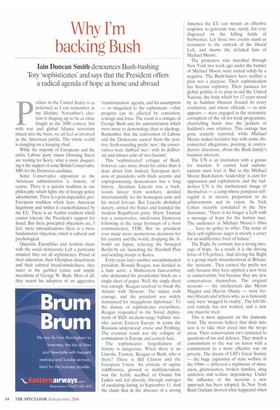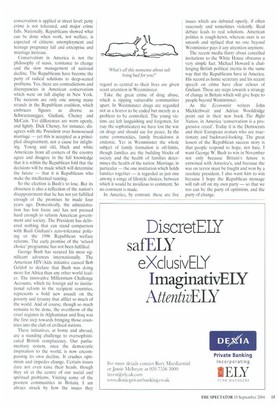Why I'm backing Bush
lain Duncan Smith denounces Bush-bashing Tory 'sophisticates' and says that the President offers a radical agenda of hope at home and abroad
p. olitics in the United States is as
polarised as I can remember in my lifetime. November's election is shaping up to be as close fought as the 2000 contest, but with war and global Islamic terrorism mixed into the brew, we all feel as involved as the American public. The whole world is dangling on a hanging chad.
While the majority of Europeans and the entire Labour party minus Downing Street are rooting for Kerry. what is more disquieting is the support of some British Conservative MPs for the Democrat candidate.
Some Conservative opposition to the American administration is historic, of course. There is a quietist tradition in our philosophy which fights shy of foreign policy ativenturism. There is a post-imperialist, proEuropean tradition which fears American hegemony and wishes it counterbalanced by the EU. There is an Arabist tradition which cannot tolerate the President's support for Israel. But these principled objections are, I feel, mere rationalisations; there is a more fundamental objection, which is cultural and psychological.
Quietists, Europhiles and Arabists share with the social democratic Left a particular mindset: they are all sophisticates. Proud of their education, their Olympian detachment and their cultural broad-mindedness, they sneer at the garbled syntax and simple rnoralisms of George W. Bush. Most of all, they resent his adoption of an aggressive 'transformation' agenda, and his assumption — so misguided to the sophisticate —that progress can be effected by conviction, courage and force. The result is a critique of George Bush and his administration which owes more to demonology than to ideology. Remember that the reinvention of Labour and the Democrats earned them the positive, fresh-sounding prefix 'new'; the conservatives were dubbed `neo', with its deliberate and sinister echo of `neo-fascism'.
This 'sophisticated' critique of Bush, however, says more about his critics than it does about him. Indeed, European derision of presidents with thick accents and unprepossessing demeanours has a long history. Abraham Lincoln was a backwoods lawyer from nowhere, derided internationally for his homespun suits and his moral fervour. But Lincoln abolished slavery, united the States and founded the modern Republican party. Harry Truman was a conservative, small-town Democrat following in the large footsteps of a born communicator, FOR. But no president ever made more momentous decisions for his country and the world, dropping the Abomb on Japan, relieving the besieged Berlin by air, launching the Marshall Plan and sending troops to Korea.
Forty years later another unsophisticated president, Ronald Reagan, was derided as a ham actor, a Midwestern faux-cowboy who demanded his presidential briefs on a single sheet of paper. Well, the single sheet was enough. Reagan resolved to break the detente with Moscow. The stance took courage, and the president was widely denounced for 'megaphone diplomacy'. To the dismay of sophisticates everywhere, Reagan responded to the Soviet deployment of SS20 medium-range ballistic missiles across Eastern Europe in terms the Russians understood: cruise and Pershing. The eventual result was the collapse of communism in Europe and central Asia.
The sophisticates' forgetfulness of history is dangerous. When there is no Lincoln, Truman, Reagan or Bush, who is there? There is Bill Clinton and the European Union. An attitude of supine indifference, glossed as multilateralism, was the fertile seedbed of Osama bin Laden and led directly, through outrages of escalating daring. to September 11. And the claim that in the absence of a strong America the EU can mount an effective response to genocide was, surely, for ever disgraced on the killing fields of Srebrenica. Let those two events stand as testament to the outlook of the liberal Left, and shame the deluded fans of Michael Moore.
The protesters who marched through New York two week ago under the banner of Michael Moore were united solely by a negative. The Bush-haters have neither a plan nor a purpose. Their sophistication has become sophistry. Their panacea for global politics is to pray-in-aid the United Nations, the body which for 12 years stood by as Saddam Hussein flouted its every resolution, and whose officials — as now appears — were engaged in the systematic corruption of the oil-for-food programme, channelling funds into the pockets of Saddam's own relatives. This outrage has gone scarcely reported, while Michael Moore makes lucrative hay with some disconnected allegations, pointing in contradictory directions, about the Bush family's business interests.
The UN is an institution with a genius for inaction. It cannot lead nations: nations must lead it. But to the Michael Moore Bush-haters 'leadership' is cant for oppression and exploitation, and the rudderless UN is the institutional image of themselves — a camp whose pompous selfregard is in inverse proportion to its achievements and its vision. As Nick Cohen recently concluded in the New Statesman. 'There is no longer a Left with a message of hope for the human race. The audiences at Michael Moore's films
. have no policy to offer. The noise of their self-righteous anger is merely a cover for an indifference bred of failure.'
The Right, by contrast, has a strong message of hope. As a result, it is the driving force of US politics. And driving the Right is a group much misunderstood in Britain: the 'neocons'. They earned the prefix not only because they have applied a new twist to conservatism, but because they are new conservatives themselves. The original neocons — the intellectuals like Myron Magnet and Marvin Olasky — were former liberals and leftists who, as is famously said, were 'mugged by reality'. The left-liberal remedy has not worked, and a new one must be tried.
This is most apparent on the domestic front. The neocons believe that their mission is to take their creed into the no-go areas. Their conservatism isn't restricted to questions of tax and defence. They match a commitment to the war on terror with a commitment to a more effective war on poverty. The dream of LBJ's Great Society — the huge expansion of state welfare in the 1960s — delivered a nightmare of alienation, ghettoisation, broken families, drug addiction and welfare dependency. Under the influence of the neocons a new approach has been adopted. In New York Rudi Giuliani showed what happened when conservatism is applied at street level: petty crime is not tolerated, and major crime falls. Nationally. Republicans showed what can be done when work, not welfare, is expected of citizens: unemployment and teenage pregnancy fall and enterprise and marriage increase.
Conservatism in America is not the philosophy of stasis, resistance to change and the slow management of national decline. The Republicans have become the party of radical solutions to deep-seated problems. Yes, there are contradictions and discrepancies in American conservatism which were on full display in New York. The neocons are only one among many strands in the Republican coalition, which embraces figures as diverse as Schwarzenegger, Giuliani, Cheney and McCain. Yet differences are worn openly, and lightly. Dick Cheney, for instance, disagrees with the President over homosexual marriage — yet this is accepted as a principled disagreement, not a cause for infighting. Young and old, black and white Americans from all corners of the country agree and disagree in the full knowledge that it is within the Republican fold that the decisions will be made which will determine the future — that it is Republicans who make the intellectual running.
So the election is Bush's to lose. But its closeness is also a reflection of the nation's disappointment that he has not yet fulfilled enough of the promises he made four years ago. Domestically, the administration has lost focus and has not pressed hard enough to reform American government and society. The President has delivered nothing that can stand comparison with Rudi Giuliani's zero-tolerance policing or the 1996 Republican welfare reforms. The early promise of the 'school choice' programme has not been fulfilled.
George Bush has secured his most significant advances internationally. The American HIV/Aids initiative caused Bob Geldof to declare that Bush was doing more for Africa than any other world leader. The innovative Millennium Challenge Accounts, which tic foreign aid to institutional reform in the recipient countries, represents a bold new assault on the poverty and tyranny that afflict so much of the world. And of course, though so much remains to be done, the overthrow of the cruel regimes in Afghanistan and Iraq was the first step towards bringing those countries into the club of civilised nations.
These initiatives, at home and abroad, are a standing challenge to oversophisticated British complacency. Our parliamentary system. once the democratic inspiration to the world, is now encompassing its own decline. It crushes optimism and impedes change. Certain issues dare not even raise their heads, though they sit at the centre of our social and spiritual problems. Visiting some of the poorest communities in Britain, I am always struck by how the issues they regard as central to their lives are given scant attention in Westminster.
Take the great crime of drug abuse, which is ripping vulnerable communities apart. In Westminster drugs are regarded not as a horror to be ended but merely as a problem to be controlled. The young victims are left languishing and forgotten, for (say the sophisticates) we have lost the war on drugs and should sue for peace. In the same communities, family breakdown is endemic. Yet in Westminster the whole subject of family formation is off-limits, though families are the building blocks of society and the health of families determines the health of the nation. Marriage, in particular — the one institution which holds families together — is regarded as just one among a range of lifestyle choices. between which it would be invidious to comment. So no comment is made.
In America, by contrast, these are live issues which are debated openly, if often raucously and sometimes violently. Real debate leads to real solutions. American politics is rough-hewn, whereas ours is so smooth and stylised that no one beyond Westminster pays it any attention anymore.
The recent media flurry about cancelled invitations to the White House obscures a very simple fact. Michael Howard is challenging British political inertia in the same way that the Republicans have in America. His record as home secretary and his recent speech on crime have clear echoes of Giuliani. These are steps towards a strategy of change in Britain which will give hope to people beyond Westminster.
As the Economist writers John Micklethwait and Adrian Wooldridge point out in their new book The Right Nation, in America 'conservatism is a progressive creed'. Today it is the Democrats and their European avatars who are reactionary and backward-looking. The great lesson of the Republican success story is that people respond to hope, not hate. I want George W. Bush to win in November not only because Britain's future is entwined with America's, and because the war on terror must be fought and won by a resolute president. I also want him to win because I hope the Republican message will rub off on my own party — so that we too can be the party of optimism, and the party of change.



















































































 Previous page
Previous page